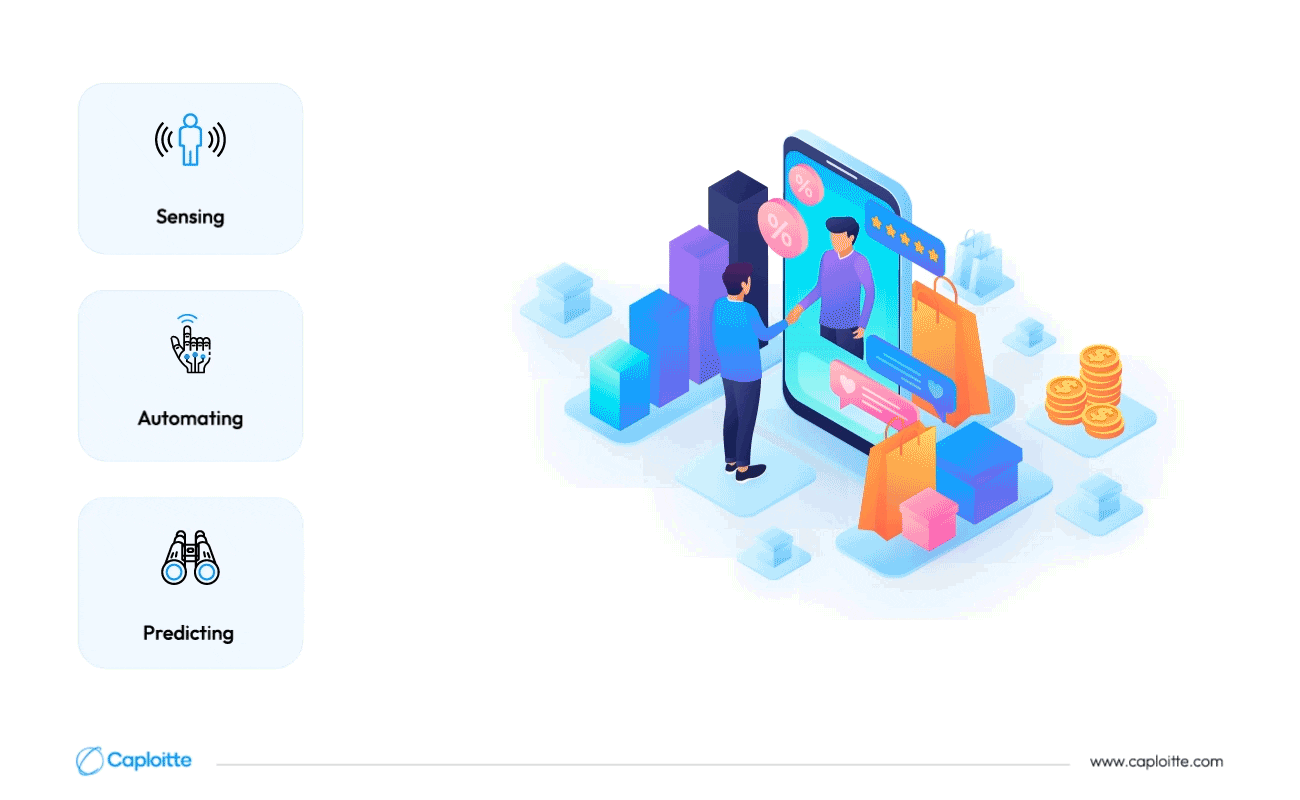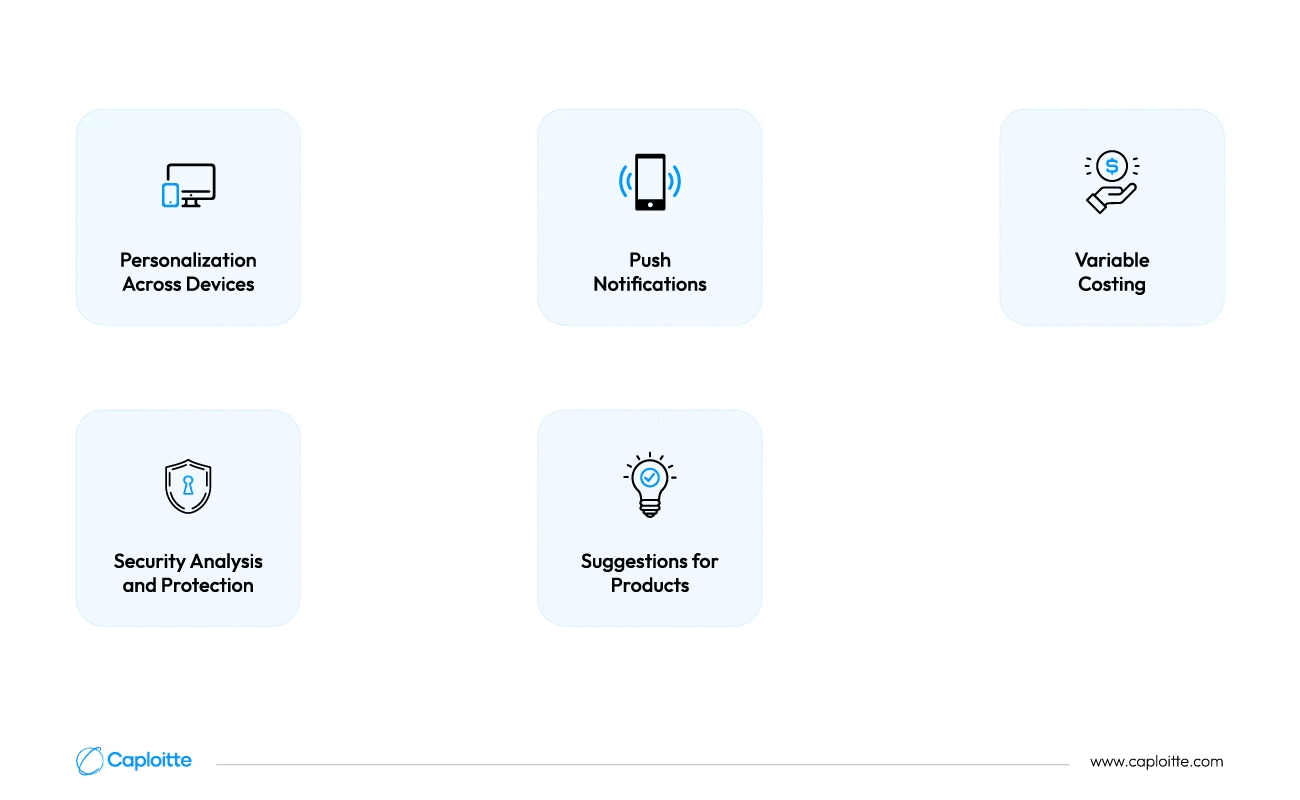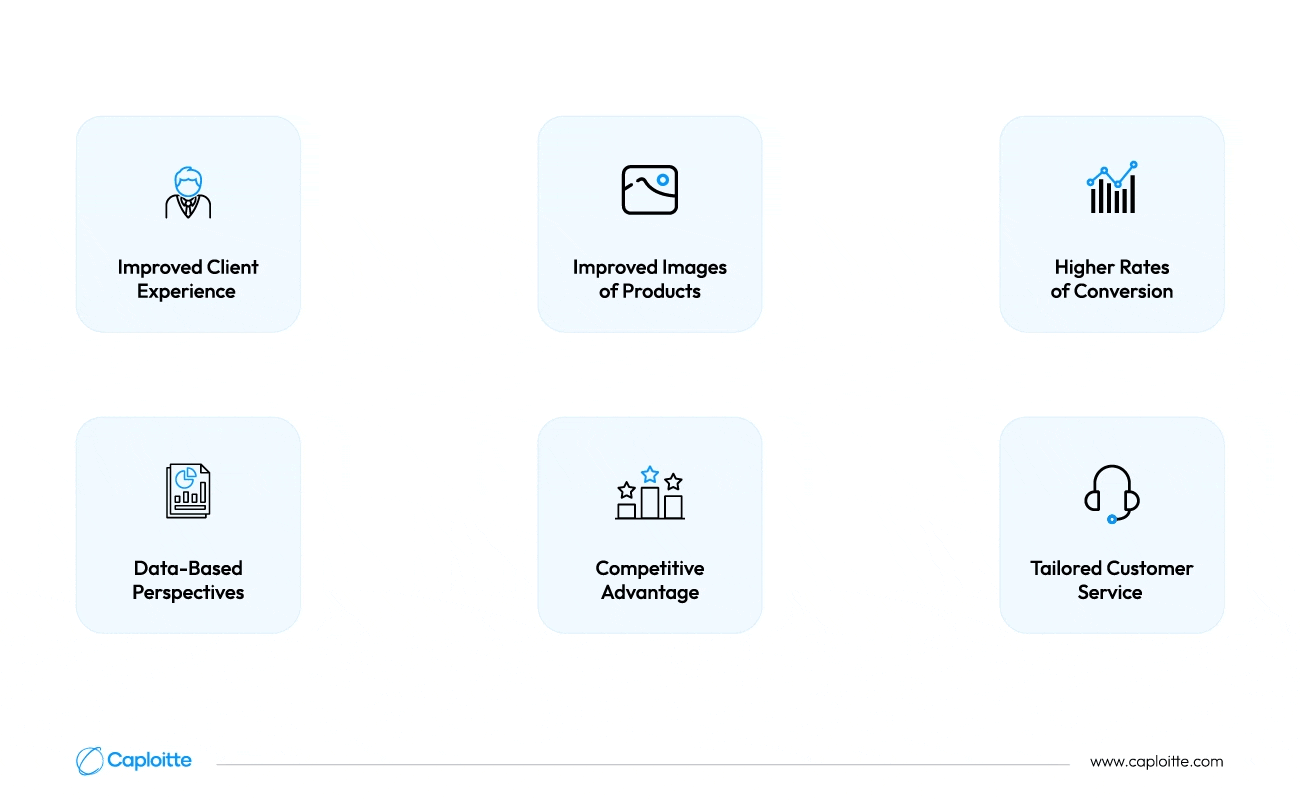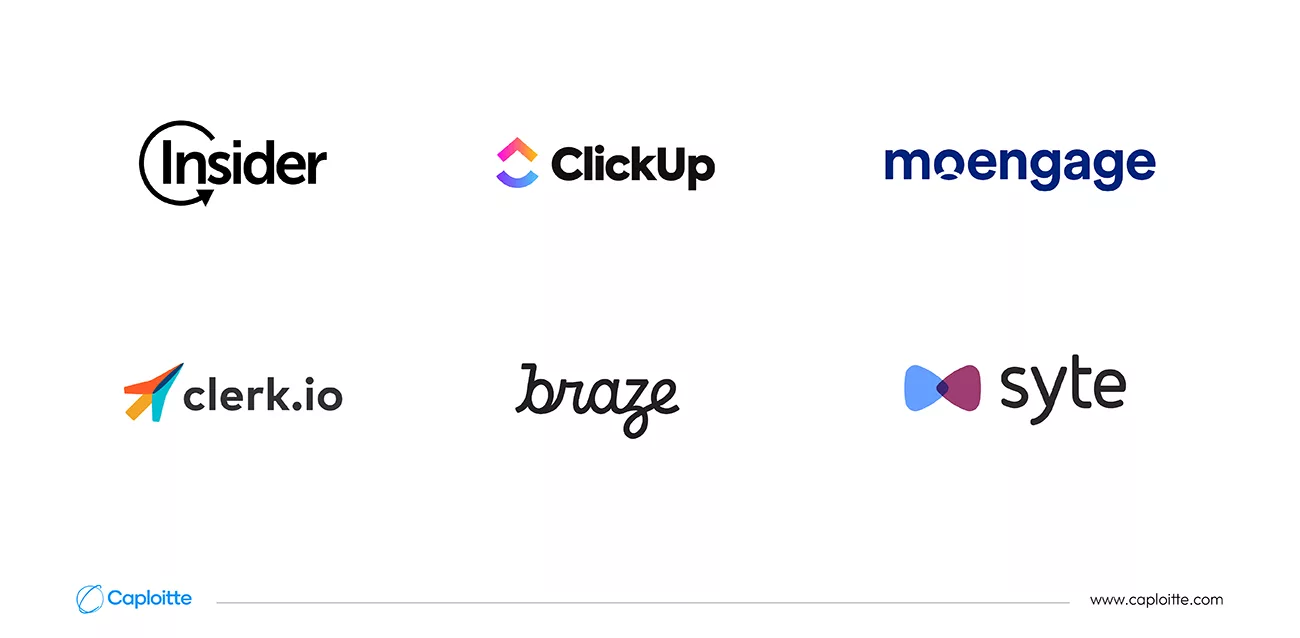The Role of AI in E-Commerce Personalization
-
Caploitte
-
07 April 2024
-
05 Min Read
Comprehending Artificial Intelligence
AI’s Ascent in E-Commerce
Artificial Intelligence’s Significance in eCommerce Personalization
AI’s Effect on E-Commerce
The Automation
AI Personalization Tools for eCommerce
Conclusion
Launching products such as OpenAI’s ChatGPT has led to a boom in conversations on Artificial Intelligence (AI) in recent months. The introduction of AI into the e-commerce personalization space is nothing short of revolutionary. Thanks to technological improvements and the growth of the internet, customers can now explore, buy, and receive things all from the convenience of their homes. Artificial Intelligence (AI) integration in the e-commerce sector, especially in the customization arena, is one important component that has played a critical role in this progress. The secret to drawing in new customers and encouraging recurring business is personalization. e-commerce businesses are better positioned than ever to provide a remarkable shopping experience because of the development of AI technologies.
Comprehending Artificial Intelligence

Fundamentally, e-commerce personalization is about giving each consumer a buying experience that seems especially tailored to them. The skill of selecting products, information, and suggestions that speak to a person’s interests, wants, and behaviors is both an art and a science.
An artificial intelligence (AI) simulation that is capable of sensing, automating, and predicting data is referred to as AI. Artificial intelligence works by utilizing additional technologies such as neural networks, machine learning, and deep learning to extract the most valuable information from the data that is gathered. Online shops may then utilize this data to improve their overall consumer experiences.
The effectiveness of artificial intelligence applications is demonstrated by the fact that 84% of e-commerce businesses are either implementing AI solutions into their operations or having it as their top priority, which speaks volumes about the many advantages it offers.
AI’s Ascent in E-Commerce
The e-commerce industry has seen a tremendous metamorphosis in recent years, changing the way consumers purchase, interact with brands, and conduct business. Artificial Intelligence (AI) has become commonplace in everyday life, extending beyond science-fiction movies and into the internet shopping space. The number of data collected by online shoppers rose dramatically as e-commerce continued to rise. The varied interests and needs of customers could no longer be fulfilled by the outdated customizing techniques. These days, internet purchasing offers an entirely new degree of customization thanks to AI-powered personalization. AI intervened in this situation.
Many variables have contributed to this digital revolution, but one of the most important ones is the incorporation of artificial intelligence (AI) into the core of e-commerce personalization. AI algorithms—in particular, machine learning—started to become essential to the customization of e-commerce. Artificial Intelligence (AI) has the potential to analyze large datasets to detect patterns, tastes, and behaviors specific to individual users. This would allow e-commerce platforms to offer highly customized purchasing experiences. Businesses like Amazon and Netflix, for instance, are customization experts. AI algorithms provide tailored suggestions by examining a user’s past browsing and purchasing activity. This guarantees that users are shown information and goods relevant to their interests. As a result, the one-size-fits-all strategy gave way to a more personalized and pertinent purchasing experience for every client.
Artificial Intelligence’s Significance in eCommerce Personalization

Technologies related to artificial intelligence (AI) are changing how businesses and customers interact. Personalized commerce is being revolutionized by AI in the following 5 ways:
Personalization across devices
People frequently use numerous devices when interacting with a brand, as you may have seen. As a result, client data is dispersed over several platforms. Retailers frequently face difficulties when faced with the task of consolidating and analyzing scattered data. Fortunately, multi-channel customization enabled by AI allows AI tools and technologies to keep an eye on a variety of client touchpoints, including social media, mobile apps, websites, and more.
Push notifications
The increase in mobile internet users and the decrease in email open rates present new business prospects. Like text messages, push notifications are sent straight to smartphone users and avoid being filtered by spam. By analyzing how customers engage with push notifications, AI-powered customization makes it possible to determine their unique interests.
Variable costing
With this strategy, companies can set pricing based on demand in the market, inventory levels, and the actions of specific customers. To modify prices, artificial intelligence systems examine consumer behavior, pricing rivalry, and market trends. Dynamic pricing based on intelligence is being used by hotels and companies to adjust tickets or rooms as needed to obtain the best deal. By using this technique, brands may optimize prices for individual customers and increase sales and profitability. It is possible to provide customized pricing that is in line with each client’s willingness to pay, which improves customer loyalty and happiness.
Security Analysis and Protection
Systems powered by artificial intelligence look for trends and abnormalities in consumer behavior to identify fraud. PayPal and Stripe secure clients’ financial information, guarantee transaction security, and employ cutting-edge fraud detection tools.
Suggestions for products
AI integration allows you to offer tailored product suggestions to improve customer experience and increase revenue. Following analysis, clients are shown content that is specifically catered to their interests. As a result, this strategy raises the possibility that clients may make further purchases after their initial objectives.
AI’s Effect on E-Commerce

The sector has been significantly impacted by the incorporation of AI in e-commerce:
Improved Client Experience
AI-driven customization has completely changed the way consumers purchase, making it more pleasurable, convenient, and engaging. This in turn promotes repeat business and client loyalty. AI helps organizations run more smoothly and utilize resources more wisely by automating a variety of functions, including product suggestions and customer care.
Improved Images of Products
When a product arrives and doesn’t live up to the expectations created by internet photos, customers are frequently disappointed. Users can search for product photos using AI-powered visual search technologies. Pinterest powers visual search using artificial intelligence (AI), enabling users to look for objects inside photos and enhancing discovery and user experience. Sellers may utilize an AI picture generator to exhibit things more attractively and provide buyers with a more realistic portrayal. To improve the purchasing experience, this entails utilizing close-ups, interactive components, and high-resolution photographs.
Higher Rates of Conversion
Tailoring experiences to clients’ choices helps them feel appreciated and understood. Customers are more likely to convert when they are shown offers and items that suit their requirements and tastes, which is achieved through personalized product suggestions and content. They are more inclined to make a buy following their personal tastes.
Data-Based Perspectives
Because AI can extract, analyze, and derive valid conclusions from massive volumes of data, almost half of businesses utilize AI technologies to manage data quality. With the use of client data, artificial intelligence (AI) produces insightful analyses that help e-commerce companies decide wisely and maximize their tactics. These insights may then be applied by online merchants to address customer concerns, produce pertinent content, and eventually comprehend each step of the buyer journey in order to provide the best possible customer experience.
Competitive advantage
Customers are more likely to get devoted to a brand when they believe it knows them and their requirements. Businesses that use AI to personalize their offerings get a competitive advantage by staying ahead of the curve and satisfying the ever-increasing demands of tech-savvy customers. Customizing the shopping process to each client’s preferences increases consumer satisfaction since they locate items that meet their unique needs.
Tailored Customer Service
It’s simple to understand why chatbots are becoming a personalized tool when you take into account sentiment, quick replies, and access to consumer data. Modern chatbots may even assist clients with completing online transactions, welcome them by name, and suggest goods and deals based on browsing and purchase history.
In essence, e-commerce personalization with integrated intelligence will see higher levels of productivity, client happiness, sales, and healthy market competitiveness. These extensive advantages support the general expansion and prosperity of your online store.
The Automation

In today’s digital age, productivity is paramount. Automation powered by AI simplifies a variety of e-commerce procedures, allowing companies to function more efficiently and on a larger scale. Let’s examine a few instances:
a) Inventory Control:
Artificial intelligence (AI) algorithms can precisely forecast demand and improve inventory levels by analyzing past sales data, market trends, and other variables. Inventory control lowers costs and boosts consumer satisfaction by preventing companies from overstocking or running out of popular items.
b) Customer Service Chatbot:
Today’s chatbots perceive not just text but also the emotion behind customer assistance queries thanks to natural language processing (NLP) and sentiment analysis. Chatbots driven by AI improve customer happiness, response times, and customer service speed. AI-driven chatbots are getting more and more well-liked because they offer round-the-clock client service. These virtual assistants are capable of processing orders, responding to frequently asked questions, and making product recommendations. Modern chatbots may even assist clients with completing online transactions, welcome them by name, and suggest goods and deals based on browsing and purchase history. Businesses can provide quick, reliable service while freeing up human agents to tackle more complicated requests by automating customer care.
c) Email Marketing Automation:
By segmenting clients according to their preferences, behavior, and past purchases, AI-powered systems may automate email marketing. Businesses may send targeted and customized emails with email marketing automation, which boosts open, click-through, and conversion rates.
AI Personalization Tools for eCommerce

There are a number of AI personalization solutions on the market that can assist companies in offering individualized purchasing experiences. These are a few of the top instruments:
1. Insider
Insider connects client data from several channels to forecast behavior with an AI-powered engine, enabling personalized cross-channel experiences. The most comprehensive collection of personalization options for websites, mobile applications, email, SMS, WhatsApp, push notifications, and other channels are all combined by Insider. Insider is another adaptable tool that you may utilize to suit your requirements.
2. Click-Up
ClickUp is a comprehensive productivity platform that can handle all of your business’s needs, including e-commerce. Make use of strong project management solutions that address a range of use cases, automation, and templates. It assists you in organizing your goals and specific actions, allocating resources as required, and managing your communication plan to make sure everyone in the team is on the same page. ClickUp’s sales capabilities provide you all the tools you need to manage your pipeline from marketing to closing deals when you’re ready to launch.
3. MoEngage
MoEngage is an award-winning platform that gives consumers relevant cross-channel experiences by using AI-driven insights. It assists marketers in developing customer-focused campaigns that use data to identify the most effective time, channel, and content to reach each individual consumer. MoEngage is trusted by over 1,200 companies with their individualized marketing initiatives.
4. Clerk.io
By employing customization and improved relevance across your customers’ purchase journeys, Clerk.io seeks to increase your online company sales. An eCommerce customization tool called Clerk.io leverages AI-powered technologies to attract, convert, and keep consumers. The AI system creates tailored content, suggestions, and search engine results that increase conversions by examining client behavior and transactions across several channels. To provide present consumers with appropriate product suggestions and search results, it automatically evaluates prior transactions and customer behavior. Cross-channel interactions and email marketing are also powered by Clerk.io. With the use of triggers, this AI e-commerce technology also automates email marketing campaigns, sending tailored product suggestions to the appropriate recipients at the appropriate times.
5. Braze
Braze is a platform for client involvement that consolidates several channels into one location. It provides an AI-powered tool stack known as Sage AI, which combines optimization, content creation, and customization. Customizing communications via external channels including email, SMS, and push notifications is Braze’s primary area of expertise.
6. Syte
Syte uses visual search, on-site navigation, and search engine optimization (SEO) to assist your clients to locate the goods they need. Additionally, it shows customers related and complementary items through hyper-personalization. For increased conversions, visual AI develops user-friendly and captivating customer experiences.
Conclusion
This growing sector will continue to have a significant influence on how merchants provide individualized consumer experiences in addition to starting to alter how companies engage with their clients. What’s your best option? Take your consumers on an AI-powered journey that will entice them to return by jumping on board. So let’s harness the potential of artificial intelligence in e-commerce to open up a world of tailored experiences and streamlined processes.
Share this post:
Read More
- All
- AI
- AR
- DevOps and CI/CD
- E-commerce
- FinTech
- IoT
- Mobile Development
- Outstaffing
- Security
- SEO
- Tech Trends
- Web Design
- Web Development




